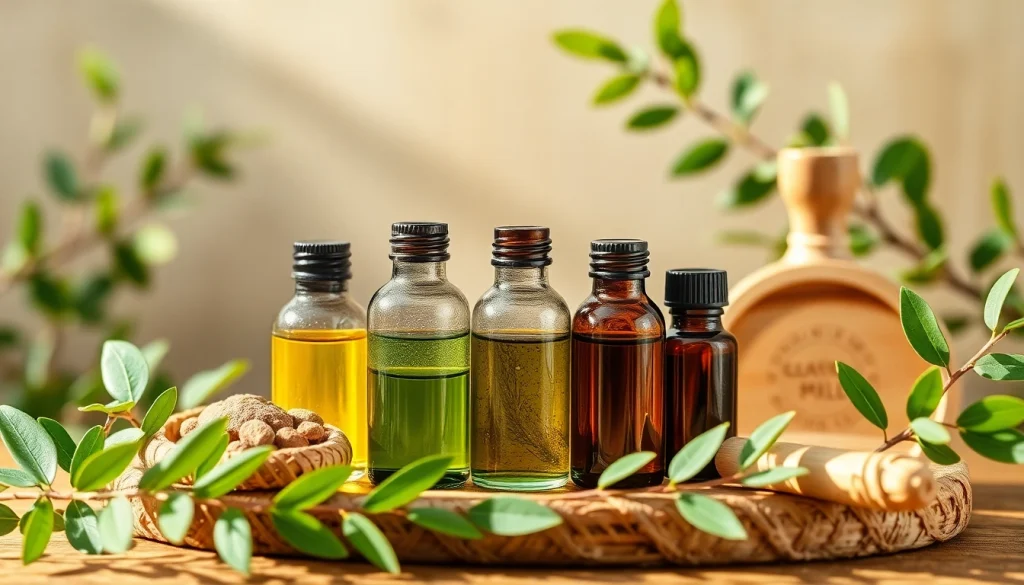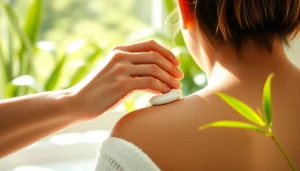Harnessing the Power of Essential Oil for Enhanced Wellness and Aromatherapy

Understanding Essential Oils
What Are Essential Oils?
Essential oils are concentrated plant extracts that capture the natural fragrance and beneficial properties of various plants. These oils are derived through different extraction methods, often resulting in a highly potent product that retains the essence of the plant’s aroma and therapeutic benefits. Recognized for their diverse applications, essential oils have gained popularity in wellness practices, holistic therapies, and natural remedies, offering a plethora of benefits for both physical and mental health. They can be used in various forms, including diffusers, topical applications, and steam inhalation, making them versatile elements in our daily lives. For an in-depth exploration of essential oils, including their therapeutic applications, visit this Essential oil guide.
The History and Uses of Essential Oils
The use of essential oils dates back thousands of years, with ancient civilizations such as the Egyptians, Greeks, and Chinese utilizing them for both medicinal and ceremonial purposes. In Egypt, essential oils were used in embalming practices and as offerings to the gods, while the Greeks and Romans incorporated them into their health and beauty routines. The ancient texts of Ayurveda and Traditional Chinese Medicine also highlight the importance of various plant extracts in promoting health and balance.
In the modern era, essential oils have found a place in alternative and complementary medicine practices. Their applications range from stress relief and improved sleep to alleviating respiratory ailments and enhancing mood. Today, aromatherapy is perhaps the most recognized use of essential oils, as practitioners use them to create a calming and healing environment, harnessing their ability to influence emotional states and physical health through olfactory pathways.
Different Types of Essential Oils and Their Benefits
With an expansive array of essential oils available, each with its unique profile and benefits, it’s essential to understand their properties. Commonly used essential oils include:
- Lavender: Known for its calming effects, lavender oil is often used to reduce anxiety, improve sleep, and alleviate headaches.
- Eucalyptus: Renowned for its decongestant properties, eucalyptus oil is often utilized in respiratory treatments and muscle pain relief.
- Peppermint: This oil is celebrated for its invigorating scent and is used to boost energy levels and improve focus.
- Tea Tree: Known for its antibacterial and antifungal properties, tea tree oil is commonly added to skincare routines to combat acne and infections.
- Lemon: Often used for its refreshing scent, lemon oil can enhance mood and energize the mind, while also having cleansing properties.
These oils can be used individually or in blends, catering to various needs and preferences, from relaxation to energy boosting.
The Science Behind Essential Oils
How Essential Oils Are Extracted
The extraction of essential oils is primarily accomplished through two methods: steam distillation and cold pressing.
Steam Distillation: This process involves passing steam through plant material, creating a vapor containing essential oil. When cooled, the vapor condenses into liquid form, separating the oil from other components. This method is commonly used for flowers, leaves, and stems.
Cold Pressing: Typically used for citrus fruits, this method extracts oils from the rind by mechanically pressing the plant. The process ensures that the natural aroma and properties of the oils remain intact, producing a high-quality product.
Both methods are designed to retain the potency of the essential oils, highlighting the delicate nature of these concentrated substances.
Biochemical Properties of Essential Oils
Essential oils consist of various compounds, including terpenes, esters, ketones, and phenols, each contributing to the oil’s aromatic profile and therapeutic effects. For example:
- Terpenes: These compounds are responsible for the fragrance and flavor of essential oils and can have anti-inflammatory and antibacterial properties.
- Esters: Known for their calming effects, esters can be found in oils like lavender, promoting relaxation and better sleep.
- Ketones: Found in oils like peppermint, ketones can aid in respiratory health and cough relief.
- Phenols: Present in oils like clove, they possess strong antioxidant properties and can support overall health.
Understanding these biochemical properties helps in selecting the right essential oils for specific health needs and enhances the efficacy of their applications.
Common Misconceptions About Essential Oils
Despite their widespread popularity, several misconceptions surrounding essential oils persist. Among these are the beliefs that essential oils are a cure-all or that they can completely replace conventional medicine. While essential oils can certainly support health and well-being, they should not be solely relied upon for serious medical conditions. Additionally, some individuals believe that all essential oils can be safely applied undiluted; however, many oils require dilution with a carrier oil to prevent skin irritation and allergic reactions. It is essential to approach the use of essential oils with knowledge and respect for their potency and to understand their role as complementary, rather than primary, health solutions.
Practical Applications of Essential Oils
Using Essential Oils in Aromatherapy
Aromatherapy is a holistic healing practice that utilizes essential oils to promote physical and emotional well-being. By inhaling the aromatic particles released by these oils, individuals can experience various benefits. Common aromatherapy practices include:
- Diffusing: Using a diffuser to disperse essential oils into the air can create a calming environment, making it ideal for relaxation or focus.
- Inhalation: Direct inhalation of essential oils from the bottle or a cotton pad can provide swift relief for headaches, stress, or fatigue.
- Bathing: Adding essential oils to bathwater can enhance the soothing effects of a warm bath, aiding relaxation and muscle relief.
Engaging with aromatherapy allows individuals to blend various oils and customize their experiences according to specific needs and preferences.
Incorporating Essential Oils into Daily Life
Integrating essential oils into daily routines can provide numerous benefits. Here are some practical ways to do this:
- Home Cleaning: Essential oils can serve as natural disinfectants. For instance, tea tree and lemon oils can enhance your household cleaning products, providing antibacterial benefits and pleasant scents.
- Skincare: Incorporating essential oils like lavender or frankincense into skincare routines can enhance skin health and address specific issues like dryness or irritation.
- Cooking: Certain essential oils, such as lemon or peppermint, can be used in cooking and baking, adding flavors while imparting potential health benefits.
Finding innovative ways to incorporate essential oils into everyday life ensures that their advantages are utilized fully, promoting a healthier lifestyle.
DIY Recipes Using Essential Oils
Creating personal blends and homemade products with essential oils is both fun and rewarding. Here are a few simple DIY recipes:
- Relaxing Lavender Pillow Spray: Mix 1 cup of water with 10-15 drops of lavender essential oil in a spray bottle. Shake well and spritz on your pillow before sleep for a calming effect.
- All-Natural Glass Cleaner: Combine 1 cup of vinegar with 1 cup of water and 10 drops of lemon essential oil for a streak-free shine.
- Invigorating Citrus Sugar Scrub: Mix 1 cup of sugar, ½ cup of coconut oil, and 10 drops of orange essential oil for a refreshing body scrub.
These DIY products not only deliver the benefits of essential oils but also encourage sustainable practices by reducing the reliance on store-bought products laden with chemicals.
Safety and Best Practices with Essential Oils
How to Choose Quality Essential Oils
Choosing high-quality essential oils is crucial to reaping their full benefits safely. Look for these indicators:
- Purity: Opt for oils labeled as 100% pure essential oils, avoiding those with additives or synthetic fragrances.
- Transparency: Select brands that provide detailed information about their sourcing and extraction methods.
- Testing: Reputable companies often provide third-party testing results to verify the purity and quality of their oils.
By prioritizing quality, users can ensure they are utilizing safe and effective essential oils in their practices.
Essential Oil Dilution Guidelines
Essential oils are highly concentrated substances, necessitating proper dilution for safe use. General guidelines include:
- For Adult Topical Use: Dilute essential oils in a carrier oil at a ratio of 1-2 drops of essential oil to 1 teaspoon of carrier oil for body use.
- For Children: A more conservative approach is recommended. Use 1 drop of essential oil diluted into 1 tablespoon of carrier oil for topical application.
- For Face Use: Use 1 drop of essential oil per tablespoon of carrier oil to test sensitivity on delicate facial skin.
Ensuring proper dilution helps prevent skin reactions and enhances the overall efficacy of essential oils.
Potential Allergies and Reactions
While essential oils are generally safe for use, some individuals may experience allergic reactions or sensitivities. It’s essential to conduct a patch test by applying a diluted oil to a small area of the skin before widespread use. Common reactions can include:
- Skin irritation or redness
- Respiratory issues when inhaling concentrated oils
- Headaches or nausea from strong scents
If any adverse reactions occur, discontinue use immediately, and consult a healthcare practitioner for further guidance. Recognizing individuality in responses to essential oils fosters a safe and enjoyable experience.
The Future of Essential Oils in Holistic Health
Current Trends in Essential Oil Usage
As the holistic health landscape evolves, essential oils are gaining recognition as valuable tools for wellness. Users are increasingly drawn to natural remedies, with essential oils emerging as multi-functional solutions that address a wide range of concerns. Their popularity in wellness centers, spas, and home-care settings is on the rise, demonstrating a collective shift toward integrative health approaches that incorporate the mind-body-spirit connection.
Research and Innovations in Essential Oil Applications
The body of research surrounding essential oils is steadily growing, delving into their benefits and applications in various health domains. Recent studies have focused on:
- Clinical Benefits: Research into the effects of essential oils on conditions like anxiety, chronic pain, and sleep disorders is expanding, with findings indicating promising adjunctive treatment opportunities.
- Innovative Products: Brands are innovating by integrating essential oils into skincare, wellness supplements, and eco-friendly household products, catering to an environmentally conscious and health-focused market.
- Aromatherapy Practices: Advanced aromatherapy practices, including emotional support through scent, are gaining traction, emphasizing tailored approaches for individual wellness journeys.
As studies reinforce the benefits of essential oils, we can expect their applications to broaden and become further integrated into mainstream health practices.
Integrating Essential Oils into Holistic Healing Approaches
The integration of essential oils into broader holistic health approaches emphasizes their role as a complementary resource. Practitioners across various disciplines are recognizing the value of combining essential oils with traditional therapies, such as psychotherapy, chiropractic care, and massage therapy. This synergy allows for:
- Comprehensive Care: Addressing mental, physical, and spiritual well-being by incorporating the calming and therapeutic aspects of essential oils.
- Personalized Treatment: Tailoring essential oil applications based on individual client needs and preferences, enhancing client compliance and engagement.
- Education and Empowerment: Educating clients about the use and benefits of essential oils fosters a sense of agency and promotes proactive self-care habits.
As interest in holistic health continues to grow, essential oils will undoubtedly play a vital role in shaping future wellness practices, offering individuals natural and effective solutions for improving their overall quality of life.






